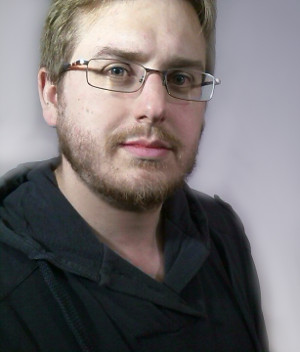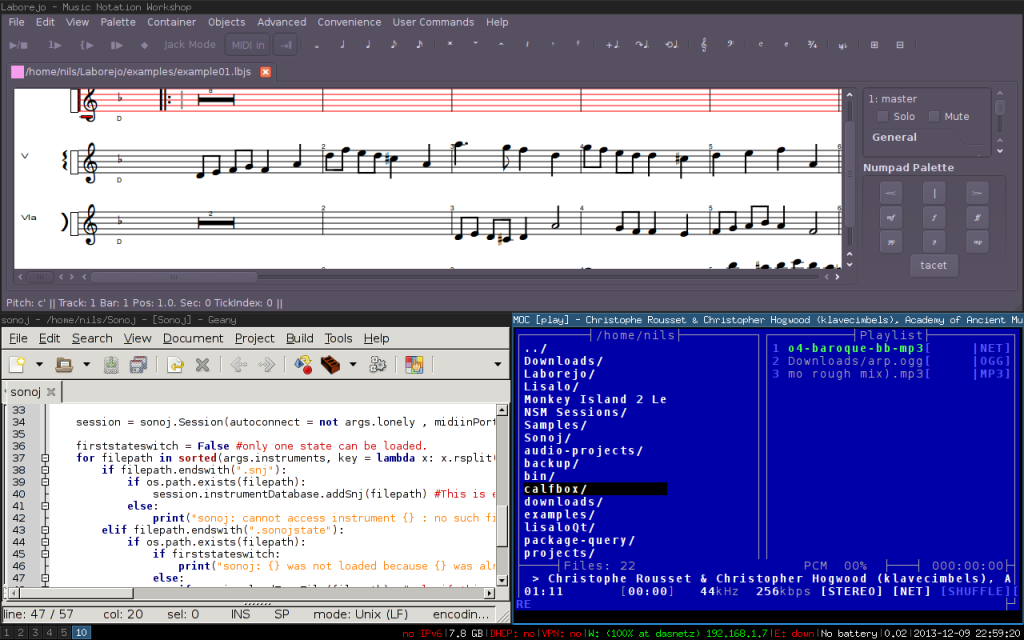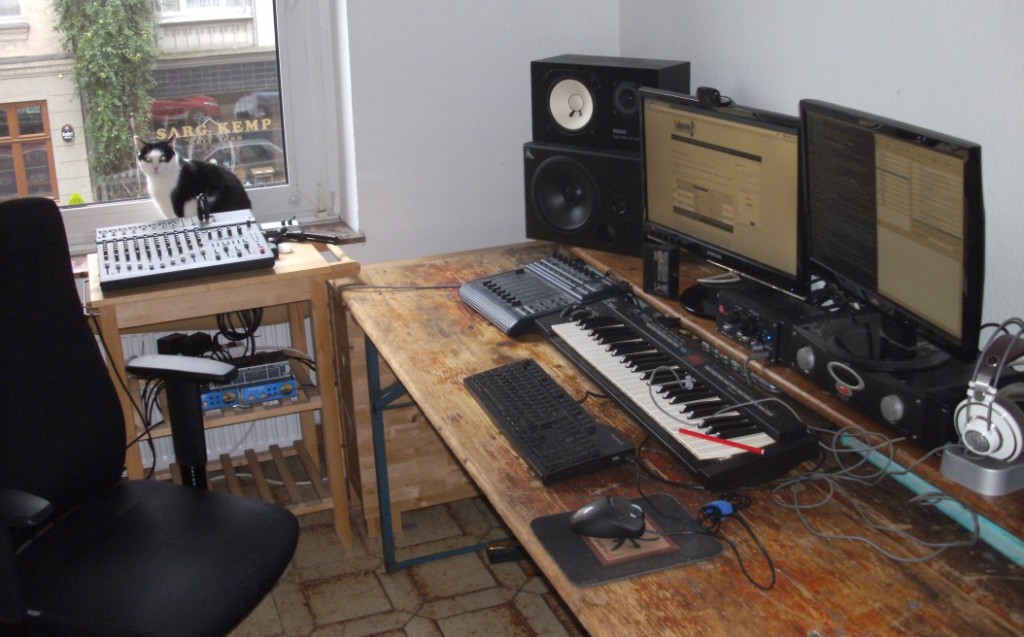Friday Interview #9: Nils Gey
Hi, and welcome to the 9th edition of the Friday Interview! This week, we're joined by a musician and programmer who is writing his own notation software, sampler, and has made numerous other contributions to the Linux audio ecosystem. I'm very happy to introduce the 9th participant of the series, interviewee #9: Nils Gey! Lets get started!
Introducing Nils Gey
 Nils Gey himself.
Nils Gey himself.
Hi Nils! Thanks for doing this interview! What's your real name, and where do you live?
The pleasure is mine!
My name is Nils Gey (pronounced "Nealz Guy") and I live in Cologne, Germany.
What's your musical background like? What music do you like, and do you play any instruments?
I started to play and later learn the piano when I was four years old, and as additional instruments I learned the Viola at the late age of 14. The acoustic guitar is my companion since childhood and in university I learned classical western singing which I quite enjoyed. So piano and singing is what I can do best.
After school I went to the "Hochschule für Musik, Köln" ("Cologne University of Music") where I learned to teach music, compose historic music and apply and create music theory.
The music I listen to is diverse, so as a list: Heavy Metal, Renaissance Baroque and Classical, South Indian Classical, Japanese Electro-Pop, Game Soundtracks, standalone Chiptune albums. And however that 'taste' came into existence: I dislike solo-piano music and most movie soundtracks.
What's your history with Linux, and with using Linux for audio?
I switched to Linux in 2007. A bit of distro hopping in the beginning and then I settled with Archlinux and never looked back. Before that the usual Windows stuff, I think many people have a similar story.
Since I was already making music at this point in time I just looked around what programs are there and how I have to adapt my workflow. From the beginning I was no friend of Wine, so I left all that behind.
Music notation, Laborejo, and samplers
You're the author of Laborejo, music notation software. Could you tell us a bit about that, how it came about, how it works, and what your goal with it is?
Laborejo has two main goals: 1)Create a Lilypond frontend to that I can printout/to-pdf my compositions. 2)Be a JACK client so that I can directly playback and produce music with Laborejo as starting point of the JACK-chain. The sequencer.
Its main difference to other existing notation programs is that is feels more like a Sequencer or text editor than a graphic program. You don't move graphics around with the mouse until you get the paper output (WYSIWYG) but you enter data in notation form with your keyboard and MIDI instrument and let Lilypond care about the layout.
 Nils desktop with Laborejo, text-editor Geany, and audo-player MOC.
Nils desktop with Laborejo, text-editor Geany, and audo-player MOC.
For those of us that don't know, what's Lilypond?
Lilypond is a creator for high qualitfy notation PDFs. It is a compiler, like LaTeX, with a complex but human-writable/readable syntax. Basically it is a layouter. Imagine you write scribbles down on paper then give it to a friend and say "here, I want my scribbles as a good looking, printable, PDF". Lilypond is that friend. But in computer world you don't write on paper but in a text editor, using text to express notation. Laborejo steps in at that point and offers a way to directly compose, think and write in notation.
Am I right in saying that Laborejo is like a sequencer for MIDI, but only uses real notation (as opposed to for example the piano roll)?
This data centric, but still graphical, approach is very related to a MIDI sequencer. So in turned out that Laborejo is on its way to become a notation based sequencer (instead of piano-roll or tracker-columns).
When did you start working on Laborejo? What's the current state of it, and how does the future of it look?
I am a team of one and the first release was in March 2012. Now it is in Beta: The file format and the general feature set are stable but the programs performance needs a lot of work.
Since I am dog-fooding (https://en.wikipedia.org/wiki/
Where can we find Laborejo, and where can we follow the development of it?
You can find more on www.laborejo.org.
Rumors are you're also working on your own sampler. Could you tell us about that project, and what your goal with it is?
That rumor is correct. Together with Krzysztof Foltman (calf plugins) I am creating a sampler program with a secret name and git repository. It will be <marketing>Next Generation and a Linux/Cross-Platform rival for Kontakt and other competitors</marketing>.
Its design base is the awarenes of the Linux Audio enviroment with JACK and (Non-)session management which enables a robust and very powerful and streamlined worklow. This makes many things clear and easy you found confusing as a "traditional" sampler-user. Oh, and some other stuff like scripting, a super-duper instrument articulation system, custom GUIs per instrument...
And it will still be compatible with your favourite Sequencer!
Very interesting! What will be the differences between your sampler, and for example Linuxsampler, or Kontakt?
Linuxsampler is basically a .gig player. That format did one thing right when it was introduced (disk streaming), hence its popularity, and most other things wrong (key-switches). By todays standards it really is ancient tech and the music produced with these generation of sampler sounds very 90s or early 2000s. Basically it is still .sf2 with bigger wave files. And I consider Linuxsampler a failed approach for their stupid licensing choices. Essentially it is a closed source program which tries to hide as GPL, and it fooled quite an amount of people.
Kontakt has to provide everything and a kitchen sink because that is the tradition in Windows world. It has very strong core features (like scripting) but many unecessary attachments which would be just redundant in the Linux Audio Environment. We take just the good parts.
How far along is the project? For us interested, can we follow the progress of the project somewhere else?
The sampler project, in this iteration, is only two months old. We decided to not release anything until it is usable. So nothing public yet. In fact: this interview is the first official mention of this sampler at all! Before actual code there will be videos and a website, but we are not in this stage yet.
Final questions
Do you feel like anything is lacking in Linux audio today, and if so, what?
Maybe some programs and plugins are missing, but we will never find out because the user count is too low, in my opinion.
More users will boost the whole ecosystem. We get more music, which is the most important part. And because I am confident in our tools I think this music will be better than if the same person produced on another operating system with a different tool set. Of course there are other benefits, often mentioned, like bug reports, donations, motivation for the programmer etc. But in the beginning and in the end is music.
I am not talking about tricking Windows and OSX users to switch by promising them clones of their tools but genuine Linux Audio users which use the workflow provided on this system with JACK, the commandline, multiple X servers and everything that we do and love.
 The workspace of Nils Gey. Nice cat!
The workspace of Nils Gey. Nice cat!
What’s your favorite free and open source plugin currently?
The plugin I love is Fons zita-rev1. Makes everything better. I would love to see it with Non Session Management support.
Where can people get a hold of you? Is there anything you would like to add to the interview?
Follow me on Twitter https://twitter.com/NilsGey and visit my IRC channel #laborejo on irc.freenode.org.
Finally I would like to give shout out to all the people who have confidence in a Linux Audio ecosystem: developers and musicians. Keep up the good work and always remember that the one thing we get through our culture and philosophy is longterm success. This needs patience but it also gives you a sense of purpose.
My mantra:
I don't care how much Linux Audio sucks or how far it is behind. There is no race because music is basically the same for several hundred years now. And I can rest assured that future generations and my children can use Open Source software to make music because there were a handful of people who did not give in to the luring of short term gratification.
Thank you very much for the interview Nils!
That was Nils Gey. Thanks to Nils for participating, and thank you for reading!
